Sinusitis is a common infection that everyone should know how to treat at home. This knowledge is also helpful when away from home, on an expedition, or in a survival situation where you can’t access medical help.
Table of contents
Sinus Biology
A sinus is a cavity filled with air. When saying sinus, we refer to those cavities in the skull connected to the nasal passages through a narrow hole in the bone marrow (ostium).
People have four sinuses separated into four pairs:
- Frontal Sinus (situated on the forehead)
- Maxillary Sinus (that can be found under the cheeks)
- Ethmoid Sinus (that is situated between the eyes).
- Sphenoid Sinus (that is situated deep behind the ethmoid)
General Information on Sinusitis
Sinus Infections
Sinusitis is the infection of the mucous membranes that line the nasal passages. When the mucous membrane becomes inflamed, it swells.
The swelling blocks the drainage of fluid from the nose and sinus to the throat, which leads to sinus aches and pressure in that area. If the sinuses cannot drain completely, bacteria and fungi may develop.
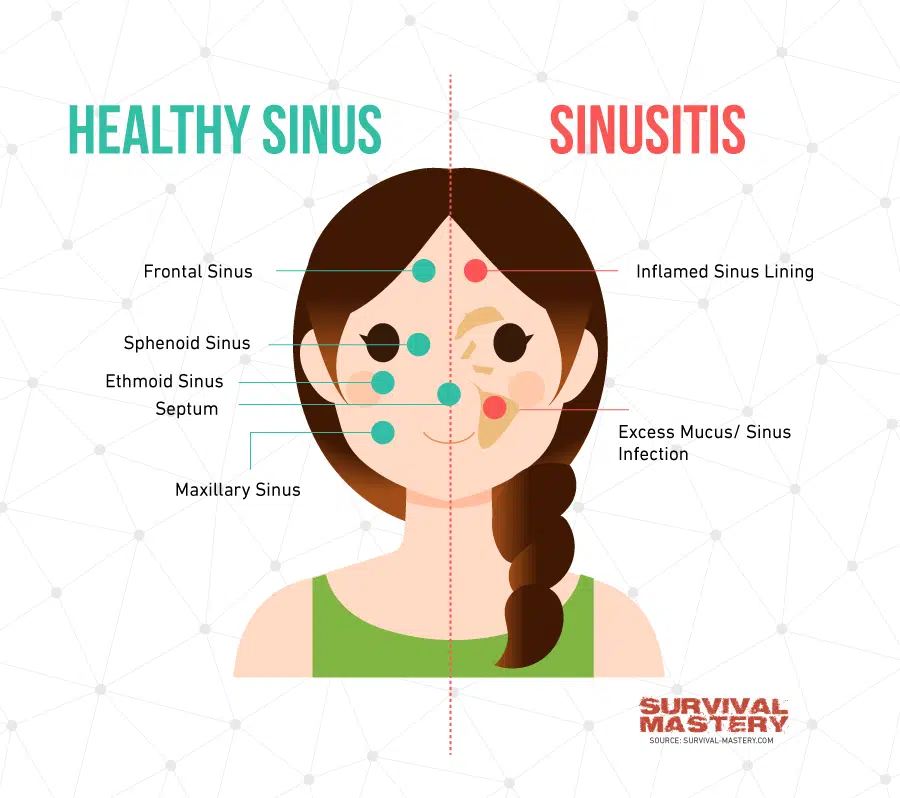
Sinusitis symptoms last longer than the common cold (5-7 days) and worsen after the 7-day mark.
There are two types of sinus infections:
- Acute (it appears suddenly)
- Chronic (the result of acute sinusitis that is not treated correctly and keeps appearing again and again). In chronic sinusitis, symptoms do not disappear completely.
What Causes Sinus Infections?
Sinus infections usually occur after the body faces a disease with a virus. This leads to mucous membrane inflammation from inside the nasal passages.
- Mucous membranes swell when they become inflamed, blocking fluid drainage from the sinuses to the nose or throat
- Mucus and fluid buildup in the sinuses cause pressure and pain
- Environmental bacteria have a foothold in the sinuses that don’t drain properly. Bacterial infection of the sinuses often cause more inflammation than pain.
Anything that causes inflammation of the mucous membrane can cause sinusitis. Many people with allergic rhinitis (nasal allergies) probably have chronic sinusitis.
Nasal polyps, foreign bodies (frequently in children), and structural disorders of the nose can obstruct the nasal passage increasing the risk of developing sinusitis.
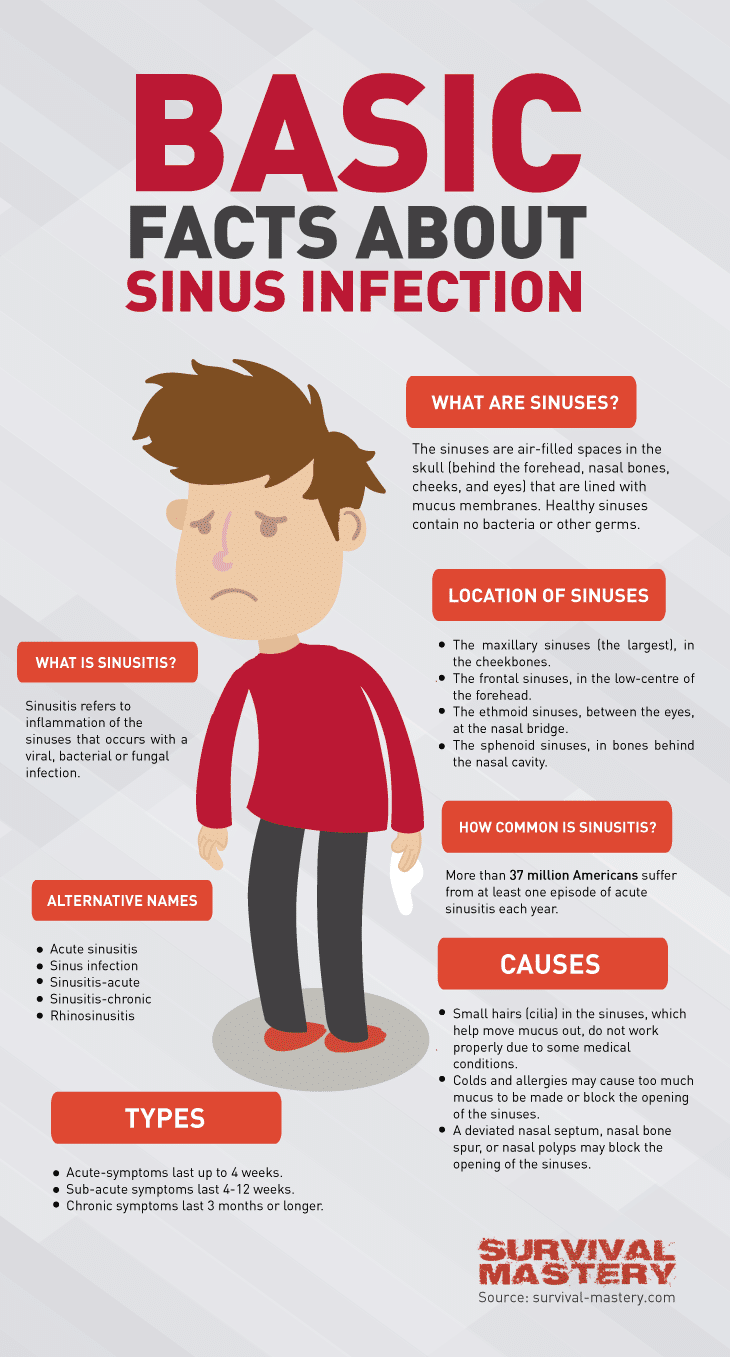
Fungal infections can also cause sinusitis. They are more common in children with deficient immune systems. Fungal sinusitis tends to become chronic and is more challenging to treat than bacterial types.
Sinus Infection Types
Sinusitis can be classified in various ways, depending on how long the problem lasts (acute, sub-acute, chronic).
- Acute sinusitis is defined as having a duration of less than 30 days.
- Subacute sinusitis lasts a period from one to three months .
- Chronic sinusitis is defined as lasting longer than 3 months.
Usually, sinus infections are triggered by common viruses or bacteria. Subacute and chronic sinusitis is most likely the result of improper or incomplete treatment of the acute form.
Sinusitis that is considered noninfectious is usually caused by allergies or allergy triggers (irritants) and may last as long as acute, sub-acute, or chronic infections.
What are Some Sinusitis Symptoms?
The most common symptoms of sinusitis are…
- Pain and pressure in the face with the feeling of a stuffy nose filled with secretions
- Greenish or yellow discharge
- Increased pain and anxiety when moving your head.
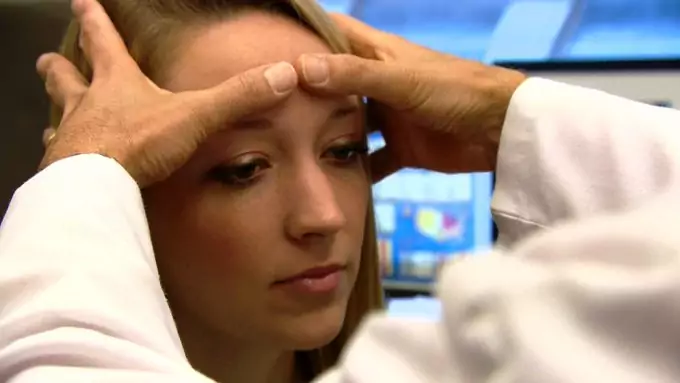
The pain or sensitivity may vary depending on the sinus that is affected:
- Cheeks or incisors’ pain may be caused by inflammation of the maxillary sinus
- Pain in the forehead, above the eyebrows, can be caused by inflammation of the frontal sinus
- Retro ocular pain (behind the eyes), in the head or in both temples can be caused by inflammation of the sphenoid sinus
- Peri orbital pain is determined by the inflammation of the ethmoid sinus.
Other common symptoms of sinusitis include:
- Headache
- Yellowish or greenish discharge from the nose leaking from the back of the throat
- Bad breath
- Productive cough
- Fever
- Toothache
- Diminished sensitivity of taste or smell
See our piece on How to Treat a Cough with Natural Remedies for more information.
How to Treat Sinusitis
There are two ways you can treat a sinus infection: with home remedies or using allopathic treatment. It is best to start with the first one, but always be careful. If symptoms worsen or persist, consult a doctor.
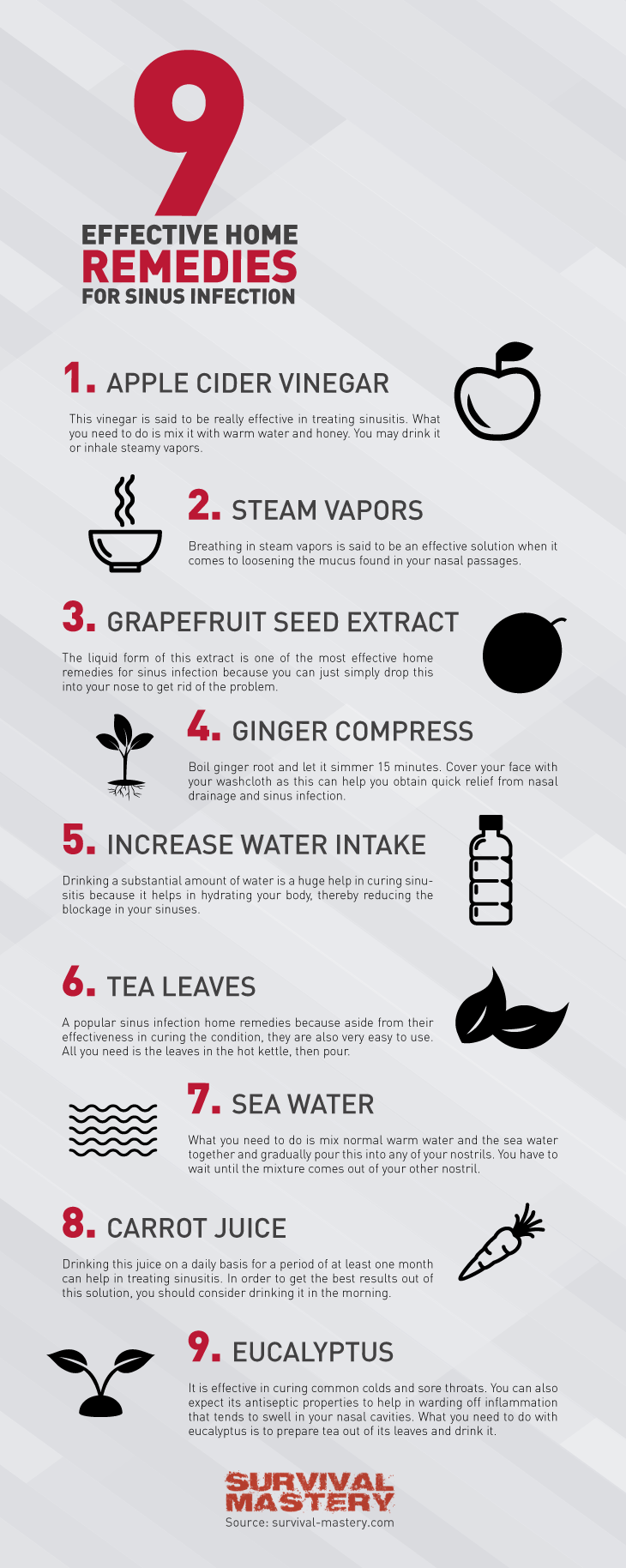
Generally speaking, common sinusitis can be treated with home remedies. However, if the pain persists for more than a week or in case of repeated sinusitis (more than three per year), see a doctor.
There are severe cases where a sinus infection can spread to the eye or the meninges, leading to severe complications. Call 911 if eye paralysis occurs, if your eyes are very irritated or if you have nausea and start vomiting.
Remedies for Treating Sinusitis While Traveling
Sinus infections may catch you unprepared, far away from home, without any medical treatment. Fortunately, there are natural remedies that can be used.
If you encounter a sinus infection on your trip, you can use essential oils or homeopathic remedies to relieve your pain.
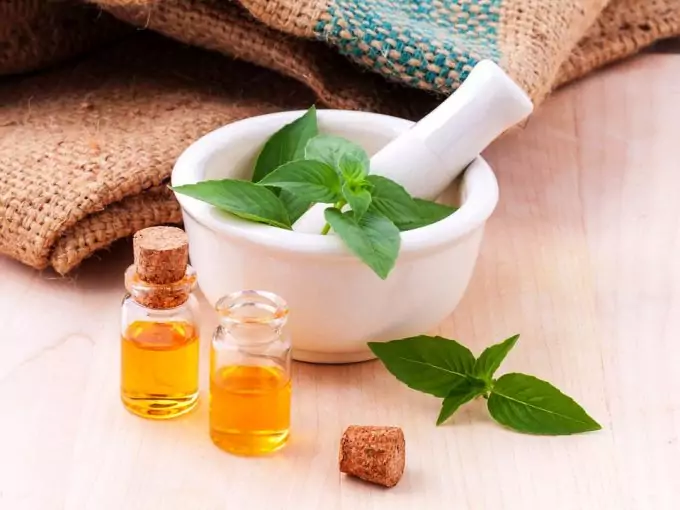
There are many essential oils that can be helpful with sinusitis: Lavender, Menthol, Eucalyptus, Oregano, Tea Tree, Peppermint, Rosemary, Thyme, Geranium, Clove, Sweet Basil, Pine, Chamomile. While you may not have access to a humidifier or a hot bath, you can…
- Place a few drops on a clean cloth and inhale. This will help release the congestion from your nose.
- Dilute the oils in a carrier oil (olive, coconut oil or whatever is available – take a small quantity in your bags, about 2 oz, you don’t need very much oil) and use this mixture to massage the pressure points on your face: temples, forehead, the side of each nostril, the inside of the eyebrows. Take care to avoid your eyes.
- Ingestion of essential oils is a matter of debate among alternative medicine practitioners. The opinions are divided: there are some that say essential oils should never be ingested while others recommend great care with them, especially for children, the elderly, or pregnant women. Do not use essential oils internally unless you seek advice from a specialist.
Homeopathic Treatment
Homeopathic treatment can help you as well. These remedies are also simple and have a long shelf life. Depending on the kind of symptoms you develop, you may use:
- Belladonna – you feel like your eyes are heavy and the pain is located in the forehead
- Kali Bichronicum – pain develops at the root of the nose and you have a thick nasal discharge
- Pulsatilla – the pain in your head decreases when standing up or getting fresh air
- Arsenicum – burning pain in the sinuses that is getting worse with high noise, light or movement
- Mercurius – pain in the head, aggravated by open air, sleeping or eating
- Hepar sulfur – effective with sinusitis developed from cold air
- Spigella – high pain on the left side of the face
Dosage: Use 6th or 30th potency and take a dose every 2 hours in the beginning when symptoms are intense and every 4 hours after that.
As with any type of treatment, we advise consulting a specialist.
Home Remedies for Sinus Infection
The Benefits of Hot Steam
- Hot vapors help relieve painful pressure in the sinuses. Take a shower as hot as you can, inhaling the steam and leaving water to run onto your face until you free your sinuses.
- Lie on the bed and apply a compress with hot water on the sinus area.
- Take a steam bath adding aromatic pine, peppermint or eucalyptus essential oil. Pour 1-2 liters of boiling water into a medium bowl, add 2-3 drops of one of the essential oils mentioned above then take a steam bath, covering your head with a towel. The steam helps with sinus drainage.
Sinus Wash
Saline solution irrigation – is an effective method for thinning mucus and reducing inflammation of the sinus mucosa.
Mix a quarter teaspoon of salt with a pinch of baking soda in a cup of warm water. Next, fill a pipette with the liquid, tip your head back, but the solution in one nostril, and pinch the other closed.
Finally, inhale deeply, then blow your nose gently. Repeat the procedure with the other nostril.
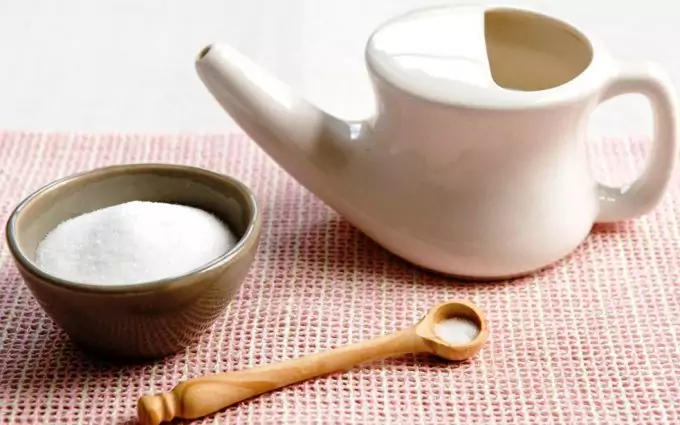
Neti pot – is a small ayurvedic container found in some pharmacies or online.
Fill it with saline solution. Place the neti pot in a nostril and bend the head to one side. The warm solution will flow into the nose through one nostril and out the other nostril, eliminating mucus. Blow your nose, then repeat the procedure.
Sinus Drainage
Horseradish – grate horseradish and inhale the smell. This vegetable contains a substance that may make mucus thinner. Avoid contact with eyes.
Horseradish and lemon juice – mix the two ingredients in equal amounts and take a teaspoon an hour before eating.
Pepper – if you like spicy foods, add a pinch of pepper or chili to your food. They contain capsaicin, a substance that promotes mucus drainage.
Recent studies have shown that allicin contained in garlic has antibacterial properties. Mix a crushed garlic clove with four teaspoons of water. Then pour ten drops in each nostril twice a day. You should notice an improvement in approximately three days.
Sleep and Relaxation
- Place a pillow under your neck when you lay down. The position of the head at the same level as the shoulders may clog sinuses.
- Lie down in a comfortable position. Then, apply a cushion with heated salt over the eyes and cheekbones. Leave it until it cools then repeat the procedure until you feel relief in your sinuses.
Facial Massage
Relieve your pain with a sinus massage to encourage blood circulation. Start by pressing the bottom of the nostrils with your fingertips, then apply pressure to your nose, under the brow. Finish by pressing each point for 30 seconds, then release.
Additionally, rosemary oil enhances the effect of the massage. Fill a bowl with hot water, pour in a few drops of essential oil, and inhale the vapors while performing acupressure.
Allopathic Thank Treatment
The medical treatment for sinus infection includes 4-5 types of medicine:
Antibiotics – in case of a bacterial infection. Antibiotics are ineffective with viral infections; they may even cause more harm. Nevertheless, statistics show that there are very few cases of bacterial sinusitis.
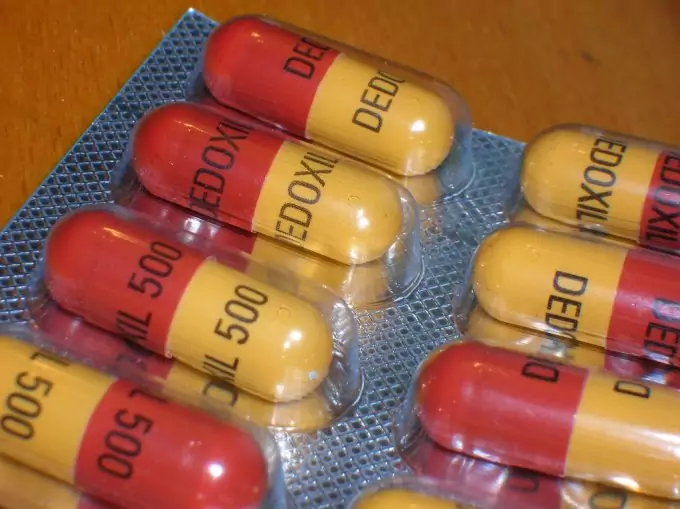
Painkillers – may include ibuprofen or acetaminophen. Don’t use them for more than ten days.
Decongestants – often in the form of pills (Contac or Sudafed) or sprays (Afrin or Dristan)
Allergy medicines – if the sinusitis occurs due to an allergy, your doctor may prescribe antihistamines.
Steroids – may reduce swelling in the membranes.
Only take allopathic treatment when prescribed by a doctor. Do not use medicine by yourself with no previous medical advice. Check out our tips on natural remedies for allergies to help you.
Better to Prevent than to Cure
Curing sinusitis once it develops can be painful and take time. There are steps you can take to prevent sinusitis from occurring in the first place.
- Install an air humidifier in the room where you sleep. Turn it on to keep your nasal passages hydrated, and clean it regularly.
- Limit your intake of alcoholic beverages. Alcohol causes inflammation of the mucosa and sinuses.
- Avoid bathing in pools with chlorinated water. Do not ever jump with your head forward. Chlorine irritates the nasal mucous membranes. In addition, the pressure exerted by the jump makes the water reach the sinuses.
- Avoid cigarette smoke. Cigarette smoke dries the airways and favors the proliferation of bacteria in the sinuses.
- Contact a dentist if you suffer from sinusitis consistently. Dental problems can cause pain.
Sinus and Altitude/Pressure
Atmospheric pressure fluctuations can be dangerous to sinuses. They may lead to an aggressive form of sinusitis, called barotraumatic sinusitis.
Symptoms include intense and brutal pain, sometimes accompanied by bleeding. It may occur in the case of a sudden take-off of a plane or during mountain climbing above 2000 meters.
When diving and returning to the surface of the water, air pressure accumulated in the sinuses must be relieved to avoid severe damage.
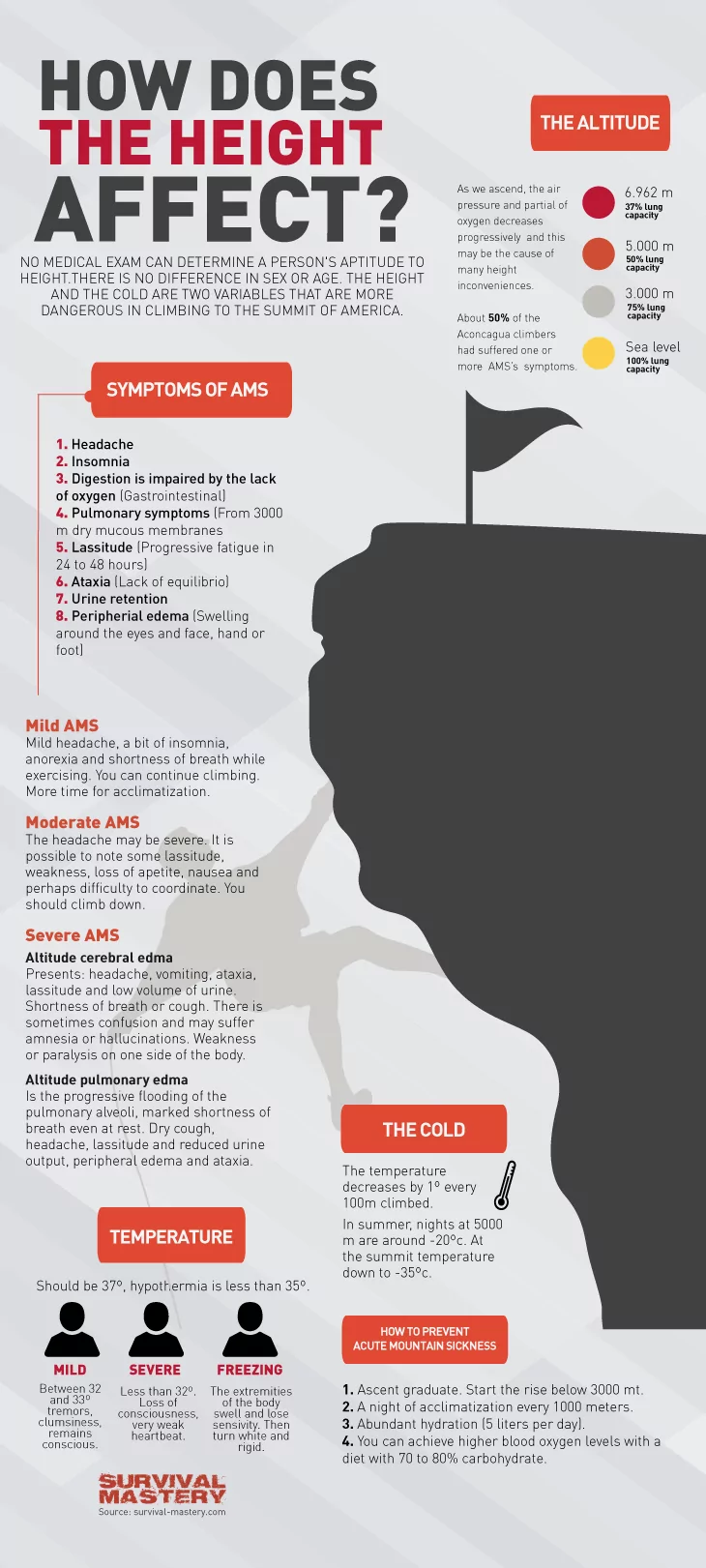
It’s not recommended to travel by plane or climb to high altitudes when you’re experiencing acute sinusitis.
Final Thoughts on Sinus Infections
If you use home remedies at the onset of Sinusitis symptoms, the treatments may stop the progression of the infection at an early stage. In some cases, home remedies may even get rid of Sinusitis.
However, pay attention to the way your body feels. If your condition worsens, or if nothing seems to relieve your pain, seek medical care and treatment by a Doctor.




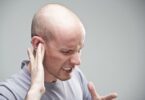
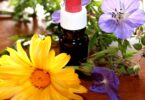
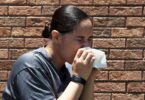

The natural remedies seem fine but still it’s better to take medical help. This is something which is better not ignored. However, the preventive measures mentioned are surely worth a try. Btw, good accumulation of information!
When you want a remedy for sinusitis, boil 1:2 ratios of vinegar and water. Drape a towel over your head and breathe in the vapor. It feels uncomfortable, but the result is great. There are a lot of other remedies, but it is still best to consult a physician.
You can also treat a mild sinus attack by eating spicy food. Include hot chili peppers or chili sauce in your diet. You can also drink brandy or whiskey moderately to widen your nasal passages. You also need to take a lot of rest. If you hike, bring a nose mask, but be sure to pack a lot and never re-use each of them. But the best of all is to consult a doctor. Professionals know what’s best.
Spicy food does have its unique way of opening up the body’s passage ways and I can definitely recommend it, although it should be consumed in moderation. Nose mask while hiking is okay but not everybody can get comfortable with that. What I would suggest is using a scarf to cover up your face. This works the same as a nose mask.
Ah, a home remedy. You can certainly do this or, for a much faster declogging experience, heat water with mint, menthol or a wollop of vapor rub then place it over your nose.
Very informative post. Thank you so much. Can’t believe that there are such a huge number of effects just from oil))) Need to learn more about it and try.
Our article should help you with sinus infection; in fact, the oils do really work.